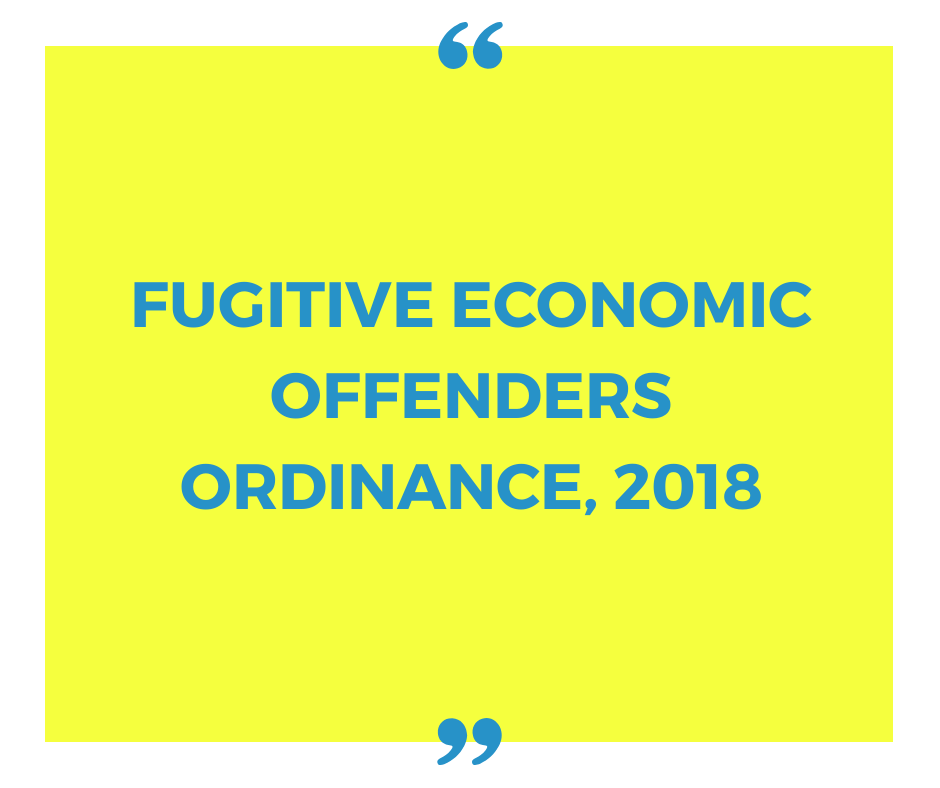The Hon’ble President has promulgated the “Fugitive Economic Offenders Ordinance, 2018″ (hereinafter referred as ‘the ordinance’) on 21st April, 2018. This Ordinance was earlier approved by the Union Cabinet headed by Hon’ble Prime Minister of India. This Ordinance is promulgated after the recent Punjab National Bank scam of Rs. 13,000 crore.
Who is a Fugitive Economic Offender?
In the Ordinance the term Fugitive Economic Offender has been used, As per Section 2(f) of the ordinance a fugitive economic offender means any INDIVIDUAL against whom a warrant for arrest in relation to a Scheduled Offence has been issued by any court in India,
Who-
1. has left India so as to avoid criminal prosecution or,
2. being abroad refuses to return to India to face criminal prosecution.
Scheduled Offence is an offence specified in the annexed scheduled to the ordinance and the amount involved in the offence is more than or equal to 100 crore rupees.
It is also prescribed in the Ordinance that the provision of this ordinance shall apply to any Individual who has become fugitive economic offender on or after the date of coming into force this Ordinance (means no retrospective effect)
What purpose will this Ordinance serve?
The ordinance seeks to re-establish the rule of law by empowering the Indian Authorities to attach and confiscate the proceeds of crime associated with economic offenders. This will also help in improving the financial health of the lending institutions. This is ordinance basically curb the practice of leaving the country after doing a serious economic offence as well as evading the process of Indian Law by remaining outside the jurisdiction of Indian Courts.
What shall be the Process?
The courts should not be overburdened, keeping this in mind the threshold to define an individual as Fugitive Economic Offender has been set at 100 crore rupees or more. The ordinance has the provisions of Special Court under the Prevention of Money Laundering Act, 2002. As per the Ordinance a Director or Deputy Director appointed under the Prevention of Money Laundering Act, 2002 may file an application to declare a person as a fugitive economic offender. The application shall contain the reasons and details to believe that an Individual is a Fugitive Economic Offender.
The application shall also contain the information about his whereabouts, a list of properties believed to be the proceeds of crime for which confiscation sought.
Apart from giving the government the power to attach or confiscate the assets of a fugitive economic offender, the Ordinance also removes the offenders’ right to defend a civil claim in the country. It also provides for the appointment of an administrator to manage and dispose of the confiscated property.
If at any point of time in the course of the proceeding prior to the declaration, however, the alleged Fugitive Economic Offender returns to India and submits to the appropriate jurisdictional court, proceedings under the proposed Act would cease by law, though All necessary constitutional safeguards in terms of providing hearing to the person through counsel, allowing him time to file a reply, serving notice of summons to him, whether in India or abroad and appeal to the High Court shall be available to the person.
Current Scenario: Since this is the ordinance as promulgated by the Hon’ble President of India and valid for a period of only 6 months and 6 weeks, so it is necessary to pass the Fugitive Economic Offenders Bill, 2018 in the due course of time. Currently, the bill has been passed by both the Houses of Parliament.
(This blog is authored by Akash Goel, Secretarial Consultant)
Disclaimer: The information contained in this article is intended solely to provide general guidance on matters of interest for the personal use of the reader. Before making any decision or taking any action, the reader should always consult a professional adviser relating to the relevant article
posting.







Add Comment